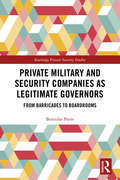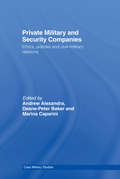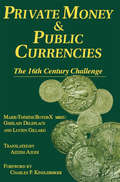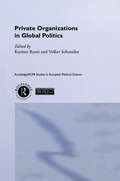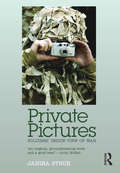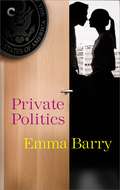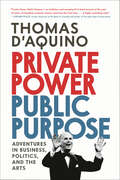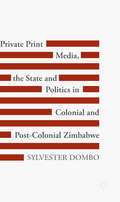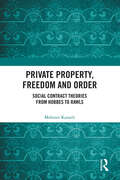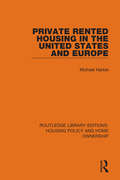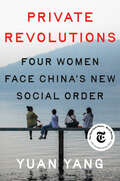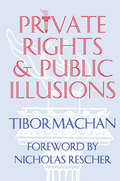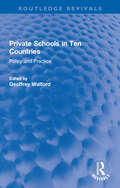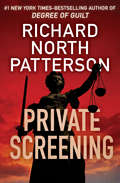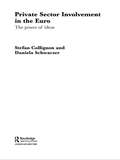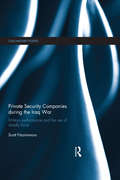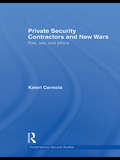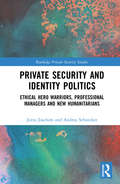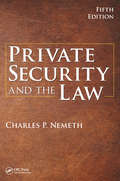- Table View
- List View
Private Military and Security Companies as Legitimate Governors: From Barricades to Boardrooms (Routledge Private Security Studies)
by Berenike PremThis book examines the legitimation of Private Military and Security Companies (PMSCs), focusing on the controversy between PMSCs and nongovernmental organizations (NGOs). While existing studies disproportionately emphasizes the ability for companies and their clients to dominate and shape perceptions of the industry, this book offers an alternative explanation for the oft-cited normalization of PMSCs and the trend to privatize security by analyzing the changing relationship between PMSCs and NGOs. It uses the concept of ‘norm entrepreneurship’ to elucidate the legitimation game between these two dissimilar actors. Starting from the 1990s, the book shows that the relationship between PMSCs and NGOs has undergone a transition by literally moving from ‘the barricades to the boardrooms’. After years of fierce advocacy and PR campaigns against PMSCs, today both actors increasingly collaborate in multi-stakeholder initiatives, elevating the status of PMSCs from a scorned actor to a trusted partner in the regulation of the industry. The work offers a comprehensive explanation of when and why this kind of collective norm entrepreneurship is likely to occur. This book will be of interest to students of PMSCs, critical security studies, global governance, international norms, and International Relations.
Private Military and Security Companies: Ethics, Policies and Civil-Military Relations (Cass Military Studies)
by Andrew Alexandra Deane-Peter Baker Marina CapariniOver the past twenty years, Private Military and Security Companies (PMSCs) have become significant elements of national security arrangements, assuming many of the functions that have traditionally been undertaken by state armies. Given the centrality of control over the use of coercive force to the functioning and identity of the modern state, and to international order, these developments clearly are of great practical and conceptual interest. This edited volume provides an interdisciplinary overview of PMSCs: what they are, why they have emerged in their current form, how they operate, their current and likely future military, political, social and economic impact, and the moral and legal constraints that do and should apply to their operation. The book focuses firstly upon normative issues raised by the development of PMSCs, and then upon state regulation and policy towards PMSCs, examining finally the impact of PMSCs on civil-military relations. It takes an innovative approach, bringing theory and empirical research into mutually illuminating contact. Includes contributions from experts in IR, political theory, international and corporate law, and economics, and also breaks important new ground by including philosophical discussions of PMSCs.
Private Money and Public Currencies: The Sixteenth Century Challenge
by M-.T.Boyer- Xambeau A. AzodiFirst Published in 1994. Routledge is an imprint of Taylor & Francis, an Informa company.
Private Organisations in Global Politics (Routledge/ECPR Studies in European Political Science)
by Volker Schneider Karsten RonitPrivate Organisation in Global Politics is a groundbreaking study which brings together a broad range of case-studies to examine the role and character of private organisations in the process of political globalization. Focusing on areas such as human rights organisations, the international women's movement and the combating of disease, the panel of expert contributors investigate the function of these in relation to governance in the globalizing world.
Private Pictures: Soldiers' Inside View of War
by Janina StrukSnapshots taken by American soldiers of Iraqi prisoners stripped naked, humiliated and tortured shocked the world in 2004 and more have followed from the conflict in Afghanistan, but whether the public have been horrified by the soldiers' conduct or the fact they have taken pictures has not been clear. In fact, as this remarkable book reveals and relates, soldiers have taken photographs of war and its atrocities for more than 100 years. But their pictures are private, intended mainly for the soldiers themselves, as mementoes or as attempts to make sense of the chaos, brutality and boredom of war. They can be gruesome or sociable, shocking or mundane and they are seldom regarded as serious contributions to a visual culture of war, which since 1939 has been dominated by professional war photography. But with the 21st-century shift to simple digital photography, transmission by the internet available to all, and a new 'citizen journalism', soldiers' pictures are acquiring a new resonance."Private Pictures" traces this unacknowledged genre of photography from the origins of popular photography in the Boer War through to the present day; it discusses how the images have been used and it asks: what effect might the wider appreciation of soldiers' pictures have on the popular perception of war?
Private Politics
by Emma BarryBook two of The Easy PartNew York socialite Alyse Philips is not the airhead people take her for-she's great at convincing D.C.'s rich and powerful to open their wallets. Never one to coast on her family's connections, her real dream is to help charities in a bigger way. Before she can pursue her ambitions, she discovers a money-laundering scandal that's got her signature all over it. If Alyse can't clear her name, she'll never work in nonprofits again.Political blogger Liam Nussbaum has been pining after Alyse for six months, certain she'd never go for a quiet guy like him. Helping her with the investigation is a no-brainer. But going up against a seedy network of money and influence isn't just a romantic opportunity or a chance to grab the headline that will take him into the big time-it's a gamble that could destroy his blog's reputation.As Liam and Alyse dig deeper, their hearts collide alongside their ambition. Will they choose love or politics? Because in Washington, everything comes at a price.70,000 words
Private Power and Global Authority: Transnational Merchant Law in the Global Political Economy
by A. Claire CutlerTransnational merchant law, which is mistakenly regarded in purely technical and apolitical terms, is a central mediator of domestic and global political/legal orders. By engaging with literature in international law, international relations and international political economy, the author develops the conceptual and theoretical foundations for analyzing the political significance of international economic law. In doing so, she illustrates the private nature of the interests that this evolving legal order has served over time. The book makes a sustained and comprehensive analysis of transnational merchant law and offers a radical critique of global capitalism.
Private Power, Public Purpose: Adventures in Business, Politics, and the Arts
by Thomas d'AquinoA remarkable memoir by the man at the apex of Canadian power for over fifty years, Private Power, Public Purpose is the ultimate insider's history in the worlds of politics, business, and philanthropy.Private Power, Public Purpose is an ambitious and sweeping first-hand account of the past 50 years of Canadian economic history, told from the front lines…. A highly rewarding read.Stephen Poloz, former Governor of the Bank of Canada and author of The Next Age of UncertaintyIn this monumental memoir, Thomas d&’Aquino offers personal insights on four decades of bold leadership at the apex of power. A transforming force in redefining the role of business and the shaping of responsible capitalism, Canada&’s private sector leader in advancing the free trade agreement with the United States, valiant defender of national unity, and passionate environmentalist, he has been at the centre of every major policy debate that has influenced contemporary Canada.Referred to by his peers as &“Canada&’s leading business ambassador,&” Private Power, Public Purpose chronicles exploits on five continents and describes how he has championed Canada&’s place as an economic player on the world stage. His insights on leadership are timeless, honed from relationships with six Canadian prime ministers, over 1000 chief executives, and dozens of global leaders. Beyond business and public policy, Thomas d&’Aquino&’s fascinating adventures in the world of voluntarism, the arts, and philanthropy reveal a great deal about the soul of this remarkable Canadian.
Private Print Media, the State and Politics in Colonial and Post-Colonial Zimbabwe
by Sylvester DomboThis book examines the role played by two popular private newspapers in the struggle for democracy in Zimbabwe, one case from colonial Rhodesia and the other from the post-colonial era. It argues that, operating under oppressive political regimes and in the dearth of credible opposition political parties or as a platform for opposition political parties, the African Daily News, between 1956-1964, and the Daily News, between 1999-2003, played an essential role in opening up spaces for political freedom in the country. Both newspapers were ultimately shut down by the respective government of the time. The newspapers allowed reading publics the opportunity to participate in politics by providing a daily analytical alternative, to that offered by the government and the state media, in relation to the respective political crises that unfolded in each of these periods. The book further examines both the information policies pursued by the different governments and the way these affected the functioning of private media in their quest to provide an "ideal" public sphere. It explores issues of ownership, funding and editorial policies in reference to each case and how these affected the production of news and issue coverage. It considers issues of class and geography in shaping public response. It also focuses on state reactions to the activities of these newspapers and how these, in turn, affected the activities of private media actors. Finally, it considers the cases together to consider the meanings of the closing down of these newspapers during the two eras under discussion and contributes to the debates about print media vis-#65533;-vis the new forms of media that have come to the fore.
Private Profits versus Public Policy: The Pharmaceutical Industry and the Canadian State
by Joel LexchinThe widespread condemnation of drastic price increases on life-saving drugs highlights our growing dependency on and vulnerability to international pharmaceutical conglomerates. However, aren't the interests of the public supposed to supersede the pursuit of private profit?In his new work, Private Profits versus Public Policy, Joel Lexchin addresses this question as he examines how public policy with respect to the pharmaceutical industry has evolved in Canada over the past half century. Although the Canadian government is supposed to regulate the industry to serve the needs of public health, waves of deregulatory reforms and intellectual property rights legislation have shifted the balance of power in favour of these companies' quest for profit. Joel Lexchin offers a series of recommendations to tip the scale back in the public's favour. This enlightening work is the first book that deals exclusively with the pharmaceutical industry in Canada in over thirty years.
Private Property, Freedom, and Order: Social Contract Theories from Hobbes To Rawls
by Mehmet KanatliThis book looks at how the ideas of freedom, property, and order are expressed in modern social contract theories (SCTs). Drawing on the theories of Hobbes, Locke, Rousseau, and Rawls, it studies how notions of freedom promulgated by these SCTs invariably legitimise and defend the private ownership of the means of production. It argues that capitalism’s impact on individual dependence and economic inequality still stems from this model, ultimately working in favour of proprietors. The author highlights the problematic nature of SCTs, which work as ideological mechanisms put forward under the guise of formal equality and formal freedom, by focusing on the historical and social context behind them. From a methodological point of view, the author presents a de-ideologization of the contractarian issue and provides insight into the political ‘layers’ within the discourse of individualism, human nature and morality shaping the outer corners of contractarian theory. An important intervention in the study of SCTs, this volume will be of great interest to scholars and researchers of political and social theory, sociology, political history, and political philosophy.
Private Rented Housing in the United States and Europe
by Michael HarloeOriginally published in 1974, this book surveys the experience of public and quasi public housing in the UK, USA, France, Germany, the former USSR, Israel, Denmark, Sweden, Hungary and Puerto Rico. Each country’s housing policy is set in a broad social and historical context, showing how the policy developed and how effective it was. Administrative problems encountered in different countries are evaluated and compared and many similarities emerge. The relationship of housing to transport, education and employment is discussed and special attention is focused on the role of new towns in Sweden, the former USSR, the UK, Israel and the USA.
Private Revolutions: Four Women Face China's New Social Order
by Yuan Yang&“As powerfully intimate as it is politically incendiary.&” —VogueNamed a Most Anticipated Book of 2024 by the BBCA sweeping yet intimate portrait of modern China told through the lives of four ordinary women striving for a better future in a highly unequal societyWhile serving as the deputy Beijing bureau chief of the Financial Times, Chinese-British journalist Yuan Yang began to notice common threads in the lives of her Chinese peers—women born during China&’s turn toward capitalism in the 1980s and 1990s, who, despite the country's enormous economic gains during their lifetimes, were coming up against deeply entrenched barriers as they sought to achieve financial stability.The product of seven years of intimate, in-depth reporting, this transporting and indelible book traces the journey of four such women as they try to make better lives for themselves and their families in the new Chinese economy. June and Siyue are among the few in their villages to graduate high school. Each makes her way to Beijing, June as a young professional and Siyue an entrepreneur. Like Siyue, Leiya lives with her grandparents in their village while her parents send money home; yearning for a different life than those of the women she sees around her, Leiya soon joins her parents in Shenzhen as an underage factory worker. Born to an urban middle-class family, Sam is outraged when her eyes are opened the poor treatment of workers, and becomes a labor activist, increasingly under threat by the authorities.As the women grapple with government policies that threaten their businesses, their children's access to education, their choice of where to make a home, and, in Sam&’s case, their lives, a vivid, damning, and urgent picture emerges of the previously unseen human cost of China&’s rising economic tide—and the courage and perseverance of those caught in the swell.
Private Rights and Public Illusions
by Tibor R. MachanWhen members of the media address politicians or report on social problems they assume that whatever issues are important in society must be a matter of public or state concern. Yet, the state or government is but a small part of any human society. Machan asserts that while the exact nature of government is a complicated question, only a totalitarian government aims to assume responsibility for every possible concern of its citizenry. Machan believes that the concept "public" is too broadly used to mean any problem that vocal citizens want government to address. Private Rights, Public Illusions focuses on the proper scope of government authority, especially in regard to people's economic or commercial affairs.The public realm is one wherein we must act collectively and subordinate individual will to a common purpose. But, according to Machan, in the rest of our spheres of concern no such subjugation is necessary or even desirable. Because he sees the public realm as smaller than is generally believed, he argues that if government continues to intervene in affairs outside this public realm, then restrictions on individual liberties will become an obstacle to society's important progress. Private Rights, Public Illusions combines empirical with philosophical analysis and argument. Its radical critique of government intervention will be of interest to policymakers, philosophers, and political scientists, and theorists.From the foreword by Nicholas Rescher, "[Machan] clearly sees that the state that protects is a state that controls, and that an all-controlling state is to all intents and purposes a prison. Deeply rooted in a widely informed background in political philosophy and American constitutional thought, Machan's book issues a clarion call against such an assault on citizen sovereignty and individual rights . . . [He] proceeds to examine a great host of issues in the domain of contemporary public policy disputes: governmental regulation, prior restraint, occupational health and safety, the right to know, pollution control, product liability, freedom of expressions, and various others. His discussion does not simply ride some ideological hobby horse—as so many in this area do—but is deeply concerned to ground its deliberations in a combined care for philosophical principles, empirical realities, and contemporary texts."
Private Schools in Ten Countries: Policy and Practice (Routledge Revivals)
by Geoffrey WalfordFirst published in 1989, Private Schools in Ten Countries provides a much needed comparative study, examining private schooling in England and Wales, Scotland, the USA, Canada, Australia, France, West Germany, the Netherlands and Japan. The authors, all experts in their field, describe the nature and extent of private schooling in an historical, economic, and social context. They discuss government policy and assess the available evidence on the relationship between attendance at a public school and the maintenance of inequalities in that society. Unique in its discussion of private schooling in a range of countries this book will enable educationists, politicians and policy makers to look beyond the confines of their own country and to give constructive consideration to the variety of ways in which education can be provided and funded
Private Screening: A Novel
by Richard North Patterson&“A crackerjack thriller&” by the #1 New York Times–bestselling author of Silent Witness: A lawyer defending a Vietnam vet is caught in a kidnapper&’s web (Publishers Weekly). All of America is watching when a sniper&’s bullet cuts down presidential hopeful James Kilcannon. As the nation rises up in outrage, one lawyer is bold enough to represent the Vietnam veteran accused of firing the fatal shot. Tony Lord has never shied away from a fight, and he will do whatever it takes to get his client a fair trial. A year later, tragedy strikes Kilcannon&’s rock-star girlfriend, Stacy Tarrant. Her assistant is kidnapped by a masked terrorist known as Phoenix, who threatens to execute him on live television unless he meets Phoenix&’s demands. As Tony helps Stacy through the ordeal, he discovers that Phoenix has connections to the Kilcannon slaying and intends to mount his own televised trial—in which Tony and Stacy are the defendants and Phoenix is the executioner.
Private Screening: A Novel
by Richard North Patterson&“A crackerjack thriller&” by the #1 New York Times–bestselling author of Silent Witness: A lawyer defending a Vietnam vet is caught in a kidnapper&’s web (Publishers Weekly). All of America is watching when a sniper&’s bullet cuts down presidential hopeful James Kilcannon. As the nation rises up in outrage, one lawyer is bold enough to represent the Vietnam veteran accused of firing the fatal shot. Tony Lord has never shied away from a fight, and he will do whatever it takes to get his client a fair trial. A year later, tragedy strikes Kilcannon&’s rock-star girlfriend, Stacy Tarrant. Her assistant is kidnapped by a masked terrorist known as Phoenix, who threatens to execute him on live television unless he meets Phoenix&’s demands. As Tony helps Stacy through the ordeal, he discovers that Phoenix has connections to the Kilcannon slaying and intends to mount his own televised trial—in which Tony and Stacy are the defendants and Phoenix is the executioner.
Private Sector Involvement in the Euro: The Power of Ideas (Routledge Advances In European Politics Ser.)
by Stefan Collignon Daniela SchwarzerThis book looks at the role of the Association for Monetary Union in Europe's role in the construction of the Euro. It argues that the AMUE played a prominent role in the adoption of a number of proposals related to the single currency and had a guiding influence on the transition from a market-let to an institution-centred approach to monetary uni
Private Security Companies during the Iraq War: Military Performance and the Use of Deadly Force (Cass Military Studies)
by Scott FitzsimmonsThis book explores the use of deadly force by private security companies during the Iraq War. The work focuses on and compares the activities of the US companies Blackwater and Dyncorp. Despite sharing several important characteristics, such as working for the same client (the US State Department) during the same time period, the employees of Blackwater fired their weapons far more often, and killed and seriously injured far more people in Iraq than their counterparts in DynCorp. In order to explain this disparity, the book undertakes the most comprehensive analysis ever attempted on the use of violence by the employees of these firms. Based on extensive empirical research, it offers a credible explanation for this difference: Blackwater maintained a relatively bellicose military culture that placed strong emphasis on norms encouraging its personnel to exercise personal initiative, proactive use of force, and an exclusive approach to security, which, together, motivated its personnel to use violence quite freely against anyone they suspected of posing a threat. Specifically, Blackwater’s military culture motivated its personnel to fire upon suspected threats more quickly, at greater distances, and with a greater quantity of bullets, and to more readily abandon the people they shot at when compared to DynCorp’s personnel, who maintained a military culture that encouraged far less violent behaviour. Utilizing the Private Security Company Violent Incident Dataset (PSCVID), created by the author in 2012, the book draws upon data on hundreds of violent incidents involving private security personnel in Iraq to identify trends in the behaviour exhibited by the employees of different firms. Based on this rich and original empirical data, the book provides the definitive study of contemporary private security personnel in the Iraq War. This book will be of much interest to students of the Iraq War, Private Security Companies, Military Studies, War and Conflict Studies and IR in general.
Private Security Contractors and New Wars: Risk, Law, and Ethics (Contemporary Security Studies)
by Kateri CarmolaThis book addresses the ambiguities of the growing use of private security contractors and provides guidance as to how our expectations about regulating this expanding ‘service’ industry will have to be adjusted. In the warzones of Iraq and Afghanistan many of those who carry weapons are not legally combatants, nor are they protected civilians. They are contracted by governments, businesses, and NGOs to provide armed security. Often mistaken as members of armed forces, they are instead part of a new protean proxy force that works alongside the military in a multitude of shifting roles, and overseen by a matrix of contracts and regulations. This book analyzes the growing industry of these private military and security companies (PMSCs) used in warzones and other high risk areas. PMSCs are the result of a unique combination of circumstances, including a change in the idea of soldiering, insurance industry analyses that require security contractors, and a need for governments to distance themselves from potentially criminal conduct. The book argues that PMSCs are a unique type of organization, combining attributes from worlds of the military, business, and humanitarian organizations. This makes them particularly resistant to oversight. The legal status of these companies and those they employ is also hard to ascertain, which weakens the multiple regulatory tools available. PMSCs also fall between the cracks in ethical debates about their use, seeming to be both justifiable and objectionable. This transformation in military operations is a seemingly irreversible product of more general changes in the relationship between the individual citizen and the state. This book will be of much interest to students of private security companies, war and conflict studies, security studies and IR in general. Kateri Carmola is the Christian A. Johnson Professor of Political Science at Middlebury College in Vermont. She received her Ph.D. from the University of California, Berkeley.
Private Security Law: Case Studies
by David Maxwell<P>A lot has changed since we began collaborating.<P> At the time that we launched this project, most intellectual property courses were taught along particular mode of protection lines: patent law, copyright law, trademark law, and trade secret law.
Private Security and Identity Politics: Ethical Hero Warriors, Professional Managers and New Humanitarians (Routledge Private Security Studies)
by Andrea Schneiker Jutta JoachimThis book examines the self-representation and identity politics of Private Military and Security Companies (PMSCs). PMSCs have become increasingly important over the past few decades. While their boom is frequently explained in functional terms, such as their cost-efficiency and effectiveness, this book offers an alternative explanation based on an analysis of the online self-presentations of forty-two US- and UK-based companies. PMSCs are shaping how they are perceived and establishing themselves as acceptable and legitimate security actors by eclectically appropriating identities more commonly associated with the military, businesses and humanitarian actors. Depending on their audience and clients’ needs, they can be professional hero warriors, or promise turn-key security solutions based on their exceptional expertise, or, in a similar way to humanitarians, reassure those in need of relief and try to make the world a better place. Rather than being merely public relations, the self-referential assertions of PMSCs are political. Not only do they contribute to a normalization of private security and reinforce an already ongoing blurring of lines between the public and private sectors, they also change what we deem to be ‘security’ and a ‘security actor’. This book will be of much interest to students of private military companies, critical security studies, military studies, security studies and IR.
Private Security and the Law (5th Edition)
by Charles P. Nemeth<p>Private Security and the Law, Fifth Edition, is a singular resource that provides the most comprehensive analysis of practices in the security industry with respect to law, regulation, licensure, and constitutional questions of case and statutory authority. <p>The book begins with a historical background of the security industry, laws and regulations that walks step-by-step through the analysis of the development of case law over the years as it applies to situations commonly faced by security practitioners. It describes the legal requirements faced by security firms and emphasizes the liability problems common to security operations, including negligence and tortious liability, civil actions frequently litigated, and strategies to avoid legal actions that affect business efficiency. <p>In addition, chapters examine the constitutional and due-process dimensions of private security both domestically and internationally, including recent cases and trends that are likely to intensify in the future. Updated coverage new to this edition includes developments in statutory authority, changes to state and federal processes of oversight and licensure, and special analysis of public-private cooperative relationships in law enforcement.</p>
Private Security: An Introduction to Principles and Practice
by Charles P. NemethThere are few textbooks available that outline the foundation of security principles while reflecting the modern practices of private security as an industry. Private Security: An Introduction to Principles and Practice takes a new approach to the subject of private sector security that will be welcome addition to the field. The book focuses on the recent history of the industry and the growing dynamic between private sector security and public safety and law enforcement. Coverage will include history and security theory, but emphasis is on current practice, reflecting the technology-driven, fast-paced, global security environment. Such topics covered include a history of the security industry, security law, risk management, physical security, Human Resources and personnel, investigations, institutional and industry-specific security, crisis and emergency planning, critical infrastructure protection, IT and computer security, and more. Rather than being reduced to single chapter coverage, homeland security and terrorism concepts are referenced throughout the book, as appropriate. Currently, it vital that private security entities work with public sector authorities seamlessly—at the state and federal levels—to share information and understand emerging risks and threats. This modern era of security requires an ongoing, holistic focus on the impact and implications of global terror incidents; as such, the book’s coverage of topics consciously takes this approach throughout. Highlights include: Details the myriad changes in security principles, and the practice of private security, particularly since 9/11 Focuses on both foundational theory but also examines current best practices—providing sample forms, documents, job descriptions, and functions—that security professionals must understand to perform and succeed Outlines the distinct, but growing, roles of private sector security companies versus the expansion of federal and state law enforcement security responsibilities Includes key terms, learning objectives, end of chapter questions, Web exercises, and numerous references—throughout the book—to enhance student learning Presents the full range of career options available for those looking entering the field of private security Includes nearly 400 full-color figures, illustrations, and photographs. Private Security: An Introduction to Principles and Practice provides the most comprehensive, up-to-date coverage of modern security issues and practices on the market. Professors will appreciate the new, fresh approach, while students get the most "bang for their buck," insofar as the real-world knowledge and tools needed to tackle their career in the ever-growing field of private industry security. An instructor’s manual with Exam questions, lesson plans, and chapter PowerPoint® slides are available upon qualified course adoption.
